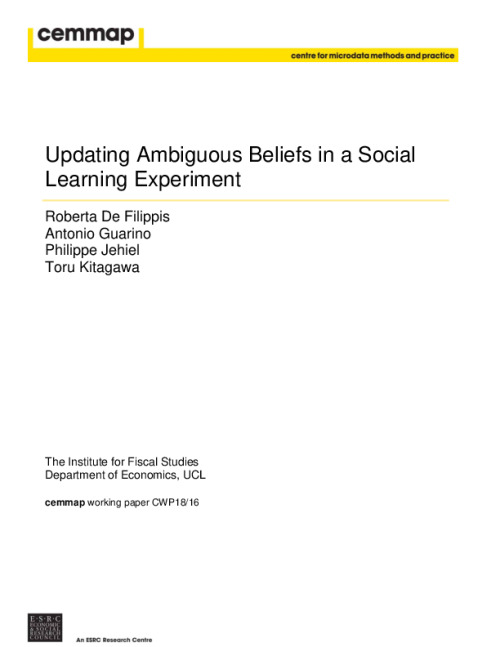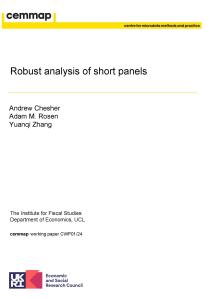Downloads

cwp181616.pdf
PDF | 501.39 KB
We present a novel experimental design to study social learning in the laboratory. Subjects have to predict the value of a good in a sequential order. We elicit each subject’s belief twice: first (“prior belief”), after he observes his predecessors’ action; second (“posterior belief”), after he observes a private signal on the value of the good. We are therefore able to disentangle social learning from learning from a private signal. Our main result is that subjects update on their private signal in an asymmetric way. They weigh the private signal as a Bayesian agent would do when the signal confirms their prior belief; they overweight the signal when it contradicts their prior belief. We show that this way of updating, incompatible with Bayesianism, can be explained by ambiguous beliefs (multiple priors on the predecessor’s rationality) and a generalization of the Maximum Likelihood Updating rule.
Authors

Research Associate University College London and Brown University
Toru is a Research Associate of the IFS, a Professor of Economics at UCL and an Associate Professor in the Department of Economics at Brown University

Antonio Guarino

Roberta De Filippis

Philippe Jehiel
Working Paper details
- DOI
- 10.1920/wp.cem.2016.1816
- Publisher
- IFS
Suggested citation
De Filippis, R et al. (2016). Updating ambiguous beliefs in a social learning experiment. London: IFS. Available at: https://ifs.org.uk/publications/updating-ambiguous-beliefs-social-learning-experiment-0 (accessed: 27 April 2024).
More from IFS
Understand this issue

Gender norms, violence and adolescent girls’ trajectories: Evidence from India
24 October 2022

Public investment: what you need to know
25 April 2024

The £600 billion problem awaiting the next government
25 April 2024
Policy analysis

IFS Deputy Director Carl Emmerson appointed to the UK Statistics Authority Methodological Assurance Review Panel
14 April 2023

ABC of SV: Limited Information Likelihood Inference in Stochastic Volatility Jump-Diffusion Models
We develop novel methods for estimation and filtering of continuous-time models with stochastic volatility and jumps using so-called Approximate Bayesian Compu- tation which build likelihoods based on limited information.
12 August 2014

Is there really an NHS productivity crisis?
17 November 2023
Academic research

Understanding Society: minimising selection biases in data collection using mobile apps
2 February 2024

Sample composition and representativeness on Understanding Society
2 February 2024

Robust analysis of short panels
8 January 2024